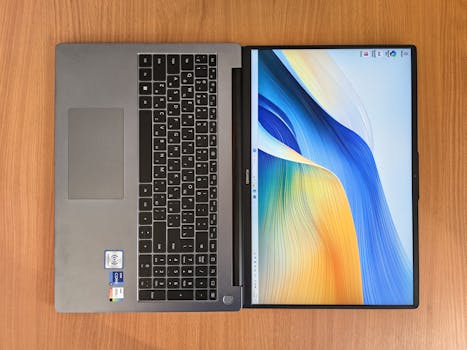Uncategorized
Transforme sua Casa em um Lar Inteligente com Tecnologia IoT
Advertisement
Nos últimos anos, o conceito de casas inteligentes ganhou popularidade, impulsionado pelas inovações em tecnologia. Com a Internet das Coisas (IoT), dispositivos comuns se transformam em ferramentas inteligentes que facilitam o dia a dia.
A possibilidade de controlar elementos da casa através de aplicativos se tornou um recurso comum. Assim, o conforto, segurança e eficiência energética são cada vez mais acessíveis ao consumidor comum.
Este artigo analisa como a Internet das Coisas e aplicativos estão moldando os lares modernos. Vamos detalhar as principais inovações e como elas podem melhorar nossa qualidade de vida.
A Revolução da Internet das Coisas
A Internet das Coisas refere-se à rede de dispositivos conectados que coletam e trocam dados entre si. Ela permite um nível de automação que antes era impensável.
Dispositivos de IoT, como termostatos, câmeras de segurança e eletrodomésticos, podem ser gerenciados remotamente. Isso está mudando a maneira como interagimos com nossa casa.
Com essa tecnologia, é possível monitorar o consumo de energia, ajustar o aquecimento e até mesmo receber alertas de segurança. A praticidade se torna uma realidade cotidiana.
Além disso, a IoT também promove a sustentabilidade. Dispositivos podem otimizar o uso de energia, contribuindo para um consumo mais responsável e ambientalmente amigável.
Por fim, a evolução continua. Novas inovações são constantemente integradas ao mercado, proporcionando funções cada vez mais abrangentes e inteligentes.
Aplicativos que Facilitam a Vida
Os aplicativos desempenham um papel crucial na transformação das casas em espaços inteligentes. Eles oferecem controle total sobre dispositivos conectados, onde quer que você esteja.
Por meio de um único aplicativo, é possível controlar luzes, temperatura e segurança. Essa centralização simplifica a gestão do ambiente doméstico.
Muitos aplicativos oferecem automações personalizadas. Você pode programar horários para que alguns dispositivos funcionem automaticamente, aumentando a eficiência e segurança.
Além disso, esses aplicativos frequentemente possuem interfaces amigáveis e intuitivas. A facilidade de uso é um dos principais motivos para sua adoção crescente.
Aplicativos também permitem monitoramento em tempo real, oferecendo informações detalhadas sobre o desempenho dos dispositivos. Isso ajuda na tomada de decisões informadas sobre o gerenciamento da casa.
Segurança e Monitoramento
Com a crescente preocupação com a segurança, dispositivos IoT se tornaram aliados fundamentais. Câmeras, sensores de movimento e alarmes estão mais acessíveis e eficientes.
Esses dispositivos podem ser acionados remotamente e enviam notificações em caso de atividade suspeita. Isso proporciona uma camada extra de proteção para sua residência.
Além disso, muitos sistemas de segurança emitem alertas de segurança em tempo real. Estes permitem que os moradores permaneçam vigilantes, mesmo quando estão fora de casa.
Integrar múltiplos dispositivos de segurança em um único aplicativo facilita o monitoramento. O usuário pode visualizar todas as câmeras e sensores em tempo real.
Vale destacar que a segurança virtual é igualmente importante. Sempre utilize senhas fortes e atualize aos dispositivos para proteger seus dados pessoais.
Conforto e Automação
A automação residencial transforma a conveniência em um novo padrão. Itens como luzes, cortinas e eletrodomésticos podem ser programados para operar de forma independente.
Por exemplo, você pode programar as luzes para acender em determinadas horas ou acionar o aquecimento antes de chegar em casa. Isso gera conforto e economia.
Os assistentes virtuais também desempenham um papel significativo. Eles permitem comandos de voz que simplificam ainda mais o controle e a interação com a casa.
A automação não se limita apenas a dispositivos de conforto. Ela também pode incluir sensores que ajustam a temperatura com base nas condições externas.
Essa experiência integrada transforma a interação com o lar, promovendo um ambiente que se ajusta às suas necessidades e estilo de vida.
Eficiência Energética
A eficiência energética é um dos principais benefícios da tecnologia IoT. Com a automação, é possível gerenciar o consumo de energia de maneira eficaz.
Dispositivos como termostatos inteligentes aprendem seus hábitos e ajustam-se automaticamente. Isso resulta em economia significativa na conta de energia elétrica.
Além disso, aplicativos podem fornecer análises detalhadas do consumo energético. Informações precisas ajudam você a entender onde e como economizar mais.
Dispositivos conectados também permitem desligar aparelhos eletrônicos que consomem energia sem necessidade. Essa gestão efetiva impacta positivamente no meio ambiente.
A eficiência energética traz benefícios financeiros e ambientais. Portanto, investir em tecnologia IoT é uma escolha inteligente e sustentável.
Integração de Dispositivos
Um dos maiores avanços da IoT é a capacidade de integrar vários dispositivos. Diferentes marcas e tecnologias agora podem trabalhar juntas para proporcionar uma experiência mais coesa.
Por exemplo, sistemas de iluminação podem interagir com segurança e climatização, criando cenários que se adaptam ao seu estilo de vida. Essa sinergia é inovadora.
Além disso, a compatibilidade entre dispositivos de diferentes fabricantes está aumentando. Isso proporciona ao consumidor mais opções ao montar seu sistema de automação.
A integração, por sua vez, simplifica o gerenciamento. Através de um único aplicativo, você pode controlar tudo que precisa sem complicação.
Isso é especialmente importante para as famílias que buscam funcionalidades sem a necessidade de múltiplos controles remotos ou aplicativos. A simplicidade é essencial.
Benefícios e Futuro da Casa Inteligente
As casas inteligentes trazem uma variedade de benefícios indiscutíveis. Além da conveniência, elas oferecem segurança, eficiência energética e conforto.
À medida que a tecnologia avança, esperamos ver ainda mais inovações. A integração de inteligência artificial e machine learning promete personalizar as experiências.
As casas inteligentes do futuro poderão aprender ainda mais sobre seus habitantes, adaptando-se automaticamente às preferências e hábitos. Isso redefine a interação homem-tecnologia.
A sustentabilidade também será um foco crescente. As casas inteligentes tendem a contribuir significativamente para a redução da pegada de carbono.
Em resumo, a evolução das casas inteligentes está apenas começando, e as perspectivas para o futuro são promissoras e empolgantes.
Conclusão
A relação entre Internet das Coisas e aplicativos está transformando nossos lares em ambientes mais inteligentes e eficientes. A segurança, automação e conforto se tornam prioridades visíveis.
A popularização dessa tecnologia resulta em casas mais acessíveis e seguras, proporcionando qualidade de vida superior ao consumidor. Portanto, investir em uma casa inteligente é investir no futuro.
Com a crescente integração de dispositivos e automação, é possível otimizar não apenas o nosso dia a dia, mas também promover práticas sustentáveis e eficientes.
Claramente, as casas inteligentes representam uma nova era de conveniência. Então, esteja pronto para aproveitar todas as vantagens que essa revolução tecnológica oferece.
Trending Topics

Jobs with short application processes: your guide to easy application jobs
Learn which jobs have short application processes, what employers usually review, and how to prepare so you can apply quickly with fewer steps.
Keep Reading


